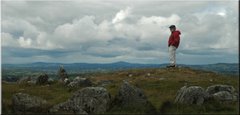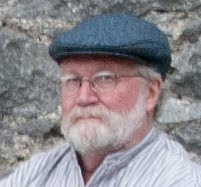Part of my puttering involved the slide scanner and my dad's boxes of thousands of 35mm slides. This time, I concentrated on images from the 1940's and 1950's, including a set from Mom and Dad's first year after their marriage.
They met in Atlanta during World War II. Dad, an X-Ray technician in the service, was stationed at Ft. Oglethorpe at the end of the war, and my mother was working at Grady Hospital, having put her graduate work at Emory University on hold for The Duration. They met at a roller rink, where Dad had gone to accompany one of his buddies who was courting Mom's glamorous sister. The match that actually struck at the rink, though, was ignited by Catherine Murphy and Sgt. Lynn Harrington.
Before being drafted in 1942, Dad had just started his career as a teacher in a high school in Mount Upton, a tiny town along the Unadilla River in Upstate New York, and he was mustered out as close to where he had been roped in as the Army could manage in the hectic, happy days after the end of the War. Shortly after they married, he was transferred to Patchogue, New York (on Long Island), and shortly after that, he was free. He went back to the Unadilla Valley with his Georgia bride, and back to work at the Mount Upton school. That was not surprising; where they lived then was astonishing.
They settled in to an abandoned farm on the top of the western Unadilla slopes, a place they always after referred to as "the Old Farm." The plan, overly-ambitious from the get-go, was to refurbish the place into a decent homestead from its terminally dilapidated condition. Here are a few of Dad's photos from that adventure:
 The farmhouse was beyond repair, rotting away. (I don't know who the people are in the above photo; Mom and Dad are certainly not among them. They're probably family members, since folks from Dad's family in Syracuse visited their project often.) Mom and Dad set up perpetual camp in one of the smaller outbuildings, and worked to transform it into a viable living space.
The farmhouse was beyond repair, rotting away. (I don't know who the people are in the above photo; Mom and Dad are certainly not among them. They're probably family members, since folks from Dad's family in Syracuse visited their project often.) Mom and Dad set up perpetual camp in one of the smaller outbuildings, and worked to transform it into a viable living space.The sleeping arrangement may look cozy, but -- familiar as I am now with the effects of moisture on straw bedding for our chickens -- if the "mattress" ever got wet, it was bad news.
 Mom's hammer-wielding technique could use some work itself here, but there's no mistaking the determination on her face.
Mom's hammer-wielding technique could use some work itself here, but there's no mistaking the determination on her face.Dad's mom passed away a year later, a month before I was born. His dad, Arthur George Harrington, was a machine-gang foreman in Syracuse during the depression, and is the child mentioned in this document from 1876.
Mom, remember, was a recently-transplanted city girl. She never did quite get used to being close to cows.

 A fine home along the approach road to the Old Farm, winter '46-'47. The Old Farm site is up the hill behind us from this vantage point.
A fine home along the approach road to the Old Farm, winter '46-'47. The Old Farm site is up the hill behind us from this vantage point. This sort of thing must have been an enormous shock to an Atlanta gal's system -- but she weathered 37 more Upstate winters with aplomb before they, in retirement, moved back South.
This sort of thing must have been an enormous shock to an Atlanta gal's system -- but she weathered 37 more Upstate winters with aplomb before they, in retirement, moved back South.But the Old Farm remained in them somewhere deep, and appreciation for what it meant, both historically and as part of a fundamental worldview, managed to work its way into me somehow.
This year's was a good Thanksgiving for me, all things considered. A very good one.














10 comments:
Did they happen to buy that farmhouse from a fellow named "Mr. Haney"?
When I try to describe our bizarre and primitive abodes during the WW2 era, I know my kids think I'm embroidering the facts. Wish we'd taken pictures - but,even if we had, yours would beat them by a mile. And yet - those were some of The Good Old Days.
Mike's Mom
They must have done an astonishing amount of work in a short time! You're a little vague on dates but it sounds like barely 2 years, if that? And i know that white house must the aforementioned outbuilding they transformed, but judging by the, uh kitchen and bedroom, that pretty winter scene is one amazing transformation. Wow.
The way your mom holds the hammer looks ok to me! 8~)
My slip-up, Ruth -- that white house is one along the road to the Old Farm, not the shelter they were working on. I'll make that clearer when I get a chance to revise.
Mike, I don't think Oliver and Lisa ever did this or this. Not that Mom and Dad ever did, mind you, just showin' a couple of pictures of what they didn't do.
Nope. Didn't do it.
Your picture project is inspiring. I have a box of old (some from the '20s) 16-mm home movies that my grandfather shot. I've had some of them transferred to DVD. It's something to watch your 2-year-old father, dressed like a little cowboy and bearing a truly breath-taking resemblance to your now-deceased younger sister, playing in the yard of a house you remember very well. George Eastman did the world an amazing good.
Vicki
George Eastman certainly did, Vicki, as did a lot of people in Rochester* who manufactured and distributed his contribution, weaving it into the fabric of who we are. And, appropriate to note on today's 40th anniversary of Douglas Engelbart's first demonstration of a small "personal" computer with a "mouse" interface, the digital age has expanded his contribution by many orders of magnitude. Collections like the ones you and I have would probably have languished and ultimately disintegrated in dusty attic boxes or yellowed albums were it not for our ability now to digitize them and distribute them in the ways the internet allows.
And, as you say, it allows us all to see each other not only as we are, but as we were. And, as miraculous, it allows us to see ones who are no more, like your younger sister and my older son, vividly as they were.
Thanks for dropping by, Vicki, and take care of that cold.
(*) For other readers: Vicki lives and teaches in Rochester, NY, home of Eastman Kodak, and her blog is on my short blogroll.
Love these photos. Especially the one of your grandparents. They have an immediacy that other photos from that era don't seem to have.
Hey, Jafafa, and welcome to my little blog! The photos have the good appearance that they do because of two things: one, my Dad's meticulous cataloging and storage, and two, modern scanning technology, which can compensate for various types of dye deterioration. Neither of which would matter a damn, of course, if the original pictures hadn't been worthwhile!
Thanks for writinng this
Post a Comment